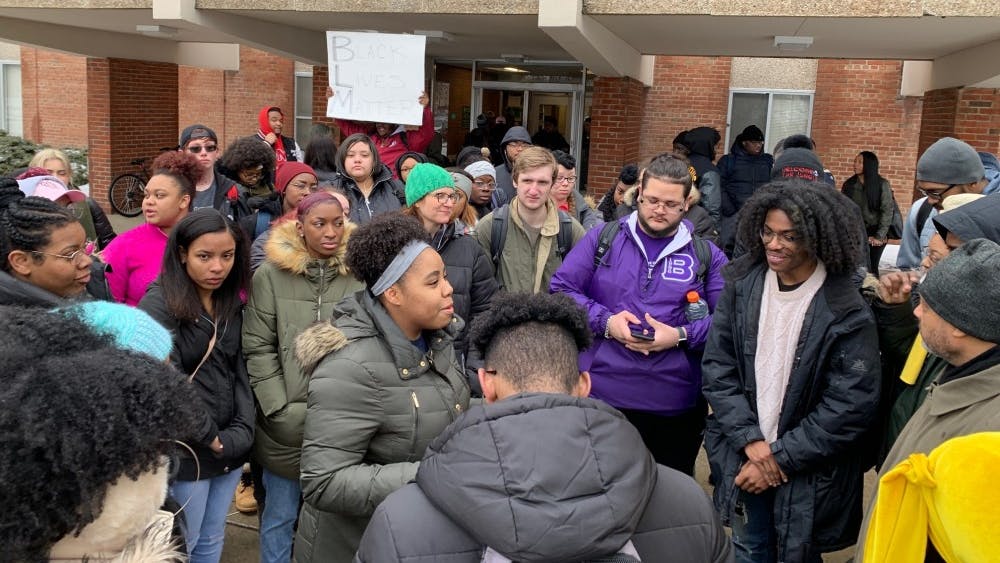The Eastern Michigan University Dean of Students, Ellen Gold, presented during the student affairs meeting of the Board of Regents on Thursday, Oct. 24. She provided to the audience the objectives and abilities of her department in assisting students through barriers. According to Gold, the bottom line of her office is to create a culture of care "which acts as a kind of mantra.” The office aims to help walk students through situations that may act as a barrier a students academic carrier or when they may ask themselves the question, according to Gold, of "What do I do?"
The Dean of Students, which as a title was formalized in 2016, has a mission of working with students, student families, faculty and staff to create a culture of care. According to Gold, "Its designed to enhance not only the students’ academic experience but their personal success." The offices aim is to look at students holistically, "Not just what they're doing in the classroom but what they are doing out of the classroom, what's working for them [and] what barriers they face."
The office may become aware of a student issue through a report, a phone call or a walk-in and issues can range from issues with academics, a student being a danger to themselves or to others, a student family crisis, mental health concerns, financial issues, the physical health of a student, a death of family member or friend of a student, concerns of a students well being or behavior, housing or food insecurity, bias incidences and if a student has a concern for someone else on campus. It is not uncommon for the office to receive complaints related to Title IX, however such incidents are referred to the Title IX office.
When notified of a student behavior concern, it is brought to the attention of the Student Intervention Team. Concerns are typically brought forward by a care report submission. Reports can be received by the team on a 24/7 basis and will be addressed by their urgency. The team will identify resources, interventions and/or referral options for the student along with other recommendations for other necessary actions. After being addressed initially, the team will review the reports progress after two weeks.
According to Gold, the office will aid the student using a solution focused approach. The ways the office can assist a student vary on a continuum from prevention to intervention, up to an including a recommendation of a leave from courses for a semester in order to improve the personal well being of the student. During her presentation Gold stated that her efforts were mainly concerned with issues in the present and what can be done rather than focusing on what issues have already occurred and what has held back the student in the past. "We will use that [information] but we are forward thinking and we are forward directed in our approach to working with [a] particular student."
Gold said that when assisting a student, the office will aid the student in effective problem solving for the problem at hand, however, the office will not solve the student's problem's for them. "We help them to solve it themselves by identifying solutions," however Gold went on to say that the responsibility of the office is solely case management.
A significant aspect of Gold's responsibilities is to notify necessary faculty and staff, when requested by a student, of their absence from campus. Request typically encompass student hospitalization, a physical or mental health issue, personal crisis or an emergency family concern that requires students to be outside of classes for an extended time. In such instances the Dean of Students will be able to notify instructors, campus employers and housing staff when necessary and requested by a student or on the student's behalf. Requests of this nature were numbered at 142 in the 2016/17 academic year, 101 in 2017/2018, 176 in 2018/2019 and as of October 24, 2019, 27 in the 2019/2020 academic year.
Dean Gold concluded her presentation with the university's Student Death Action Plan. In the case of a student who passes away, the Dean of Students will identify how to best support the family of the student and the campus community as a whole. Typically the office will receive notification from a number of sources that a student has passed away and this will be verified by the office. The office will then assess how the student was involved or active on campus in order to address who may need support and how to best plan crisis management. The office will also notify the professors of the student of the death in order for professors to be aware of the death prior to class. The Dean of Students received 25 student death notices during the 2018/2019 academic year and as of October 24, 2019, four during the 2019/2020 academic year.










